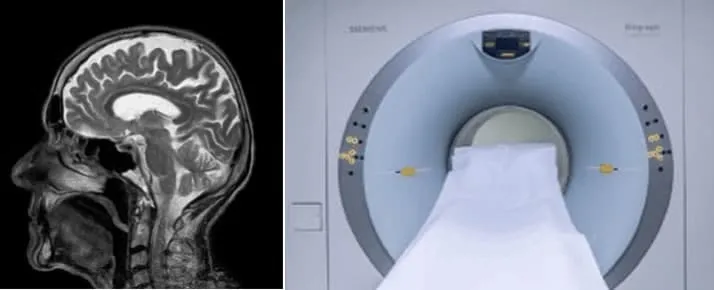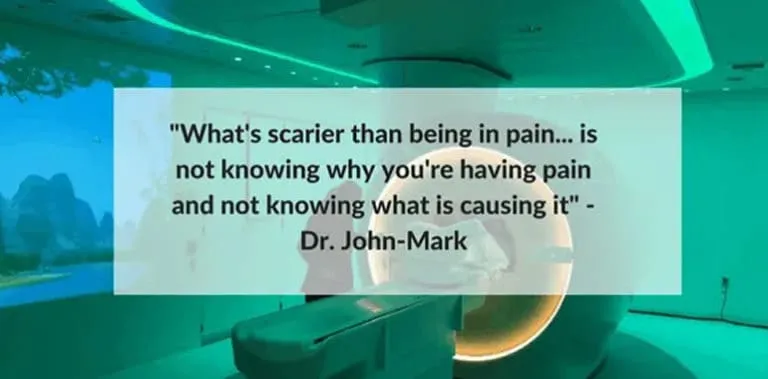The number one question I get as a physical therapist is, “Don’t I need an MRI to know what’s going on or what’s wrong?” Or stated, “Shouldn’t I get an MRI before coming in to see a physical therapist?” First of all, if you’re asking this question, then you are likely in pain, and second of all, what’s scarier than being in pain is not knowing why you’re having pain and what’s causing it? This can drive somebody to really feel like they need to know what’s causing it and thus they need to get an MRI, right? Well, let’s take a second to really consider what an MRI shows us and tells us?
The thing about an MRI, it is really good at doing what it’s intended to do and that is it will find every little defect and abnormality. It’s typically considered the gold standard when looking at tissue and determining faults or issues. So, isn’t this a good thing, right?

Well, we have to look at some other evidence and some other research of what these abnormalities actually tell us.Let’s consider a study where they looked at individuals who were asymptomatic, meaning they don’t have any pain. These normal, healthy individuals received an MRI. The MRI revealed that for people in their 20s, – 37% of individuals had evidence of degenerative disc disease. Individuals in their 30’s, 52% of them had degenerative disc disease. Your 40s, it goes up to 68%. And by the time you’re in your 60s, 88% of individuals have degenerative disc disease. And these individuals, again, are normal, healthy with no history of back pain.
The other thing the study looked at was evidences of a bulging disc. Bulging discs are not good. What the study found was that for individuals in their 20s, again normal individuals, 30% of them had a bulging disc. In their 30s, 40% had a bulging disc. And once you get into your 40s, it goes up to 50%. And by the time you’re in your 60s, 77% of individuals showed evidences of a bulging disc. People with no pain showed this pathology despite not having back pain.
What the researchers determined was that these evidences bulging disc and degenerative disc disease are just normal signs of aging. Kind of like wrinkles or gray hairs on the “inside”. They don’t necessarily tell you that something’s wrong or that something needs to be surgically fixed, they are just signs that you are getting older.
What I find is when individuals are labeled as broke or fragile by these MRIs- their beliefs about themselves change… and this changes their behaviors. And when their behaviors change, they start acting like they’re fragile and they start moving stiffer and they start cutting back and self-limiting themselves. And because of this self- restricted lifestyle and behavior, they start becoming more stiff and weak, and it just creates an environment where back pain can continue to worsen and intensify because of the change in the persons behaviors.
Another study actually looked at the cost of having an MRI. And what they actually found is if somebody has an MRI before getting physical therapy, that their cost of care actually increases by $4,793, just because they had an MRI before physical therapy.
A third study… what they look at was the percentage of MRI machines in a certain area. And what they found was that the higher volume of MRI machines in a certain area had a correlation with higher amounts of back surgeries. So, if you’re in an area where there’s a lot of MRI machines, you’re at a greater risk of having a back surgery. The > MRI machines in your area = > risk for back surgery. And they also found that just because there’s a higher surgical rate, it actually did not improve people’s outcomes.
When is it a good time to get an MRI? Are there good times? What should go into deciding this? There are four main reasons that I recommend individuals receiving an MRI sooner, rather than later.
- When there has been significant trauma or injury (severe car accident, fall, or blunt force) to the spine with associated severe
- Progressive muscle weakness.
- Any bowel or bladder changes.
- Unrelenting pain- specifically worse at night or after failing to improve with “good” physical therapy.
Now, you may be asking yourself out of these four, maybe there’s one that’s questionable or you’re not quite sure. I’d encourage you to go see a physical therapist because we can tell you, very quickly, if you need to go get an MRI or if you need to hold back and wait.
At Simply Physio, we offer a free discovery visit. This is an opportunity for you have some of these questions answered. In the 30-minute discovery visit, we will sit down and chat, and I can tell you, confidently, if you need to get an MRI first or if you’re a candidate for conservative treatment. Request a FREE DISCOVERY VISIT.
Another thing to remember is if your physician is telling you to hold off on getting an MRI, it’s probably because they’re actually very knowledgeable and that they understand that if you get an MRI first, that you’re putting yourself at greater risk for receiving spinal surgery, and you’re actually increasing your financial payout for your episode of care. Feel free to reach out to me if you have any questions concerning the topic of MRI and back pain.
If this story sounds all too familiar, or if you have been told that you have to get an MRI, give us a call! We are a specialized physical therapy practice that is well-known for helping people with this exact dilemma, while helping people avoid surgery
You can find us at 111 Fox Rd Suite 101, Knoxville, TN 37922
Call us at 865-351-3978 or request to speak to one of our specialists for FREE! We’d love to hear from you!
Dr. John-Mark Chesney, PT, DPT, OCS, CDNT helps people in Knoxville stay active, healthy and mobile – so you can spend time doing the activities you love instead of sitting at the doctor’s office. His practice, Simply Physio, specializes in using physical therapy to help people move and feel better without the use of prescription pain-killers or procedures like injections or surgery.
To find the research articles referenced in this blog post: CLICK HERE to VIEW the RESEARCH
And CLICK HERE



